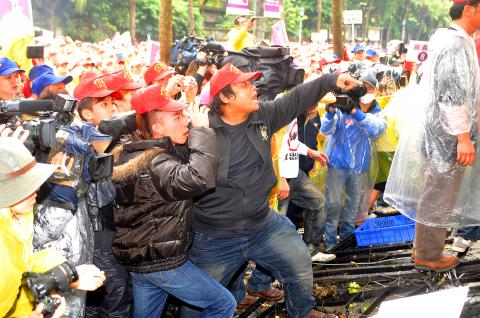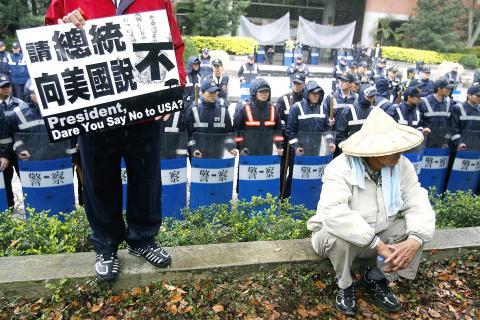Angry over the government’s plan to conditionally lift an import ban on US beef containing ractopamine residues, thousands of pig farmers converged in Taipei yesterday and pelted the Council of Agriculture building with eggs and pig excrement, as some clashed with the police deployed outside the government complex.
Many of the protesting farmers chanted anti-US beef slogans and held English-language placards that read: “President, dare you say no to USA?”
The Executive Yuan announced on Monday night that it plans to lift a ban on US beef containing traces of ractopamine, a lean-meat additive. Pig farmers fear that lifting the ban could spark widespread health concerns that would affect consumption of other meat products and undermine their livelihoods.

Photo: CNA
As the farmers gathered in front of the Legislative Yuan yesterday morning before the march, a number of lawmakers arrived and expressed their support.
Democratic Progressive Party (DPP) Legislator Gao Jyh-peng (高志鵬) said that DPP and Taiwan Solidarity Union lawmakers are against meat containing ractopamine. People First Party caucus convener Thomas Lee (李桐豪) and Chinese Nationalist Party (KMT) Legislator Yang Li-huan (楊麗環) also showed up to voice their support.
Pan Lien-chou (潘連周), spokesman for the Republic of China Swine Association, said President Ma Ying-jeou’s (馬英九) administration had been “fooling around, concealing the truth, suddenly changing its policy” and “forcing people to pray for their own fortune.”

Photo: Reuters
A hog farmer surnamed Chang (張) from Changhua County said that domestic farmers were “strict” and “never allowed to use ractopamine, but now the government is forcing us to accept meat with ractopamine residues, and we cannot allow it.”
“We are not against US beef or the TIFA [Trade and Investment Framework Agreement]. We farmers are not against economic growth, but we are against sacrificing our health,” he added. “However, the government has not presented any supplementary measures to the policy. What if it is proved that ractopamine residues do harm human health?”
“The prices of pigs have dropped rapidly since the public does not have faith in the quality of pork products now,” said another hog farmer, surnamed Lu (呂).
While it costs about NT$6,200 to NT$6,500 to raise a large pig, the price has dropped to below NT$6,000 in the past month.
“We are losing money on each pig we raise,” Lu said.
Police declined to estimate the size of the protest, but organizers put the number at about 10,000 participants.
Hsu Kuei-sen (許桂森), head of the council’s husbandry division, met the protesters and invited the directors of the national and local associations into the building for negotiations. However, one of the protest leaders and an association director, Yang Guan-chang (楊冠章), said they only wanted to meet with Council of Agriculture Minister Chen Bao-ji (陳保基).
Chen came out about two hours later and invited the representatives into the offices.
After more than an hour of negotiations, the council and the farmers reached a consensus on the five demands.
First, the council agreed to maintain its inspection standards of zero levels of ractopamine residue before the legislature makes any amendment to the Act Governing Food Sanitation (食品衛生管理法) and that it would strengthen inspections, as well as impose heavier penalties on violations.
Second, the council would negotiate with state-owned Taiwan Sugar Corp (台糖) to delay the release of its pig supply to the market and freeze excess supply of meat products.
Third, the council agreed to the farmers’ demand for the enforcement of the “95 mechanism” (a government guarantee to buy agricultural products at 95 percent of their production cost when market prices fall below a certain level).
The council also agreed to their fourth and fifth demands, to increase the agricultural budget and “not to hold the next technical advisory committee meeting before the legislature amends the Food Sanitation Management Law.”
After the rally ended, a farmer surnamed Fang (方) from Taitung County said: “I took a bus at 1am in the morning just because I cannot tolerate it anymore ... but I am only half satisfied with the result of today’s rally, because the legislature is still a barrier.”
“We should not jeopardize the health of our children, so we are against ractopamine residues in pork and beef,” Fang said. “We’ve seen pigs that eat feed containing ractopamine. The pigs’ muscles became like that of Mr Fitness and they could hardly support their own weight ... It was really strange and we can’t let people eat that.”

Right-wing political scientist Laura Fernandez on Sunday won Costa Rica’s presidential election by a landslide, after promising to crack down on rising violence linked to the cocaine trade. Fernandez’s nearest rival, economist Alvaro Ramos, conceded defeat as results showed the ruling party far exceeding the threshold of 40 percent needed to avoid a runoff. With 94 percent of polling stations counted, the political heir of outgoing Costa Rican President Rodrigo Chaves had captured 48.3 percent of the vote compared with Ramos’ 33.4 percent, the Supreme Electoral Tribunal said. As soon as the first results were announced, members of Fernandez’s Sovereign People’s Party

EMERGING FIELDS: The Chinese president said that the two countries would explore cooperation in green technology, the digital economy and artificial intelligence Chinese President Xi Jinping (習近平) yesterday called for an “equal and orderly multipolar world” in the face of “unilateral bullying,” in an apparent jab at the US. Xi was speaking during talks in Beijing with Uruguayan President Yamandu Orsi, the first South American leader to visit China since US special forces captured then-Venezuelan president Nicolas Maduro last month — an operation that Beijing condemned as a violation of sovereignty. Orsi follows a slew of leaders to have visited China seeking to boost ties with the world’s second-largest economy to hedge against US President Donald Trump’s increasingly unpredictable administration. “The international situation is fraught

MORE RESPONSIBILITY: Draftees would be expected to fight alongside professional soldiers, likely requiring the transformation of some training brigades into combat units The armed forces are to start incorporating new conscripts into combined arms brigades this year to enhance combat readiness, the Executive Yuan’s latest policy report said. The new policy would affect Taiwanese men entering the military for their compulsory service, which was extended to one year under reforms by then-president Tsai Ing-wen (蔡英文) in 2022. The conscripts would be trained to operate machine guns, uncrewed aerial vehicles, anti-tank guided missile launchers and Stinger air defense systems, the report said, adding that the basic training would be lengthened to eight weeks. After basic training, conscripts would be sorted into infantry battalions that would take

GROWING AMBITIONS: The scale and tempo of the operations show that the Strait has become the core theater for China to expand its security interests, the report said Chinese military aircraft incursions around Taiwan have surged nearly 15-fold over the past five years, according to a report released yesterday by the Democratic Progressive Party’s (DPP) Department of China Affairs. Sorties in the Taiwan Strait were previously irregular, totaling 380 in 2020, but have since evolved into routine operations, the report showed. “This demonstrates that the Taiwan Strait has become both the starting point and testing ground for Beijing’s expansionist ambitions,” it said. Driven by military expansionism, China is systematically pursuing actions aimed at altering the regional “status quo,” the department said, adding that Taiwan represents the most critical link in China’s